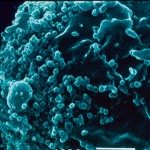Link to Pubmed [PMID] – 17511776
Clin. Exp. Immunol. 2007 Sep;149(3):430-9
Cytokines are involved in regulating HIV-1 infection. They are also placental environment major components. We assessed the potential impact of HIV-1 infection and/or anti-retroviral drugs on the placental cytokine profiles that may be involved in controlling HIV-1 placental dissemination. Placental explants were obtained after elective caesarean section from anti-retroviral-treated HIV-1-infected pregnant women and from HIV-1 non-infected pregnant women. The main placental cytokines were assessed for protein secretion in the supernatants of 24-h placental culture explants and/or in uncultured placental explants for mRNA expression levels. The cytokine profiles were different between the HIV-1-infected and the non-infected groups. Higher medians of leukaemia inhibiting factor (LIF), tumour necrosis factor (TNF)-alpha and interleukin (IL)-8 secretion were found in the 24-h culture supernatant of term placenta from HIV-1-infected women. High median levels of IL-16 and regulated upon activation normal T cell expressed and secreted (RANTES) levels were found in both groups. The mRNA expression medians were lower for TNF-alpha and IL-8 and higher for stromal cell-derived factor-1 (SDF-1) in uncultured placental explants from HIV-1-infected women. In the HIV-1-infected group, but not in the non-infected group, the secretion levels of TNF-alpha and IL-8, as well as their mRNA expression levels, were highly positively correlated; furthermore, their secretion levels were correlated positively with LIF and IL-10 secretion levels. We found no correlation between the cytokine levels and the immunovirological status of the HIV-1-infected mothers or the type or duration of treatment. These results highlight the potential impact of HIV-1 and of the anti-retroviral treatments on the placental cytokines pattern, independently of their anti-viral activity.

